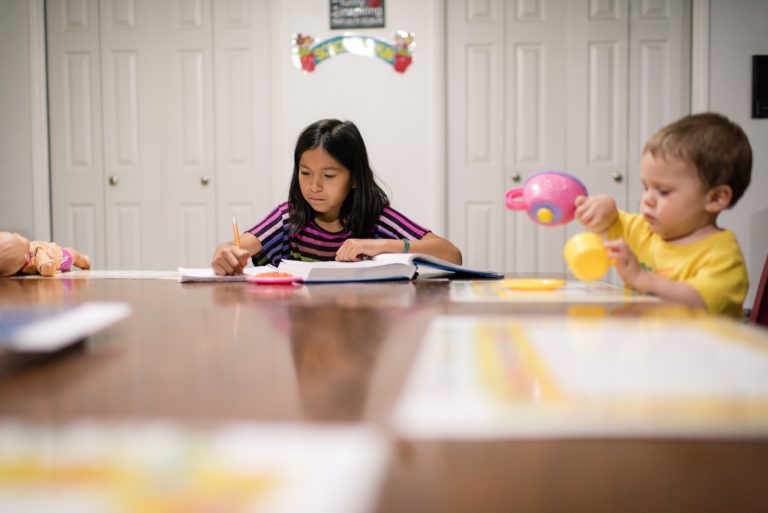Christian Homeschoolers: What Percentage Are They?
When it comes to homeschooling in the United States, there has been a significant shift in recent years.
According to a Washington Post-Schar School poll, the face of American homeschooling is no longer dominated by conservative Christians.
In fact, the percentage of homeschoolers identifying as Christian has declined significantly, from two-thirds in 2012 to just 34 percent in the Post-Schar School poll.
This change reflects a more diverse landscape of homeschooling, both racially and ideologically.
Parents are now motivated to homeschool their children for a variety of reasons. While religious instruction used to be a primary motivation, many parents cite concerns over school shootings, bullying, and political influences in public schools.
The focus has shifted towards individualized circumstances and preferences. With the rise of racial and ideological diversity among homeschoolers, it is essential to understand the changing dynamics of this educational choice.
Key Takeaways:
- The percentage of homeschoolers identifying as Christian has declined significantly, from two-thirds in 2012 to just 34 percent in the Post-Schar School poll.
- Parents are motivated to homeschool due to concerns over school shootings, bullying, and political influences in public schools.
- The face of American homeschooling has become more racially and ideologically diverse.
- Homeschooling is no longer dominated by conservative Christians but has evolved to include a broader range of families.
- This shift highlights the importance of understanding the changing dynamics and demographics of homeschooling in the United States.
Reasons for Choosing Homeschooling

The motivations for homeschooling have undergone a notable shift in recent years, moving away from solely religious reasons.
While approximately two-thirds of homeschool parents listed religious instruction as a primary reason for homeschooling in 2012, the latest poll indicates a significant decline to 34 percent.
Parents now often choose homeschooling due to concerns surrounding safety, bullying, and political influences in public schools.
The focus has transitioned to more individualized circumstances and preferences.
Changes in Homeschooling Demographics

The face of homeschooling has undergone significant changes in recent years, particularly in terms of demographics.
Previously, homeschooling was predominantly associated with white and Christian families. However, there has been a noticeable shift towards greater racial and ideological diversity within the homeschooling community.
According to a recent survey, just under half of homeschoolers are now white, compared to three-quarters in 2019.
This change can be attributed to the increasing number of Hispanic families choosing to homeschool their children.
Unfortunately, the survey did not provide conclusive data on the racial composition of Black homeschoolers.
Despite the diversification of homeschooling demographics, it is important to note that homeschooling parents as a whole still tend to lean more conservative and religious compared to the general population.
However, the increasing diversity within the homeschooling community reflects a broader range of motivations and beliefs driving this educational choice.
Attitudes towards Public Schools

Since the onset of the pandemic, attitudes towards public schools among homeschooling parents have shifted.
According to the poll, about 7 in 10 parents who began homeschooling during the pandemic expressed openness to the idea of sending their child to a local public school in the future.
This indicates that homeschooling is increasingly viewed as a complementary educational option, rather than a complete replacement for traditional schooling.
Furthermore, the survey revealed that 37 percent of homeschooling parents reported that their homeschooled child takes some classes or subjects from a public or private school.
This suggests that homeschooling families are willing to embrace a hybrid approach, allowing their children to engage with public schools on certain subjects or activities.
This shift in attitude highlights the recognition that both homeschooling and public schooling can offer unique benefits and opportunities for children’s education.
While faith-based homeschooling and religious beliefs continue to play a role in some families’ educational choices, the increasing openness towards public schools underscores the evolving landscape of homeschooling and the diverse perspectives within the homeschooling community.
Impact of Religious Beliefs on Homeschooling
While the percentage of homeschoolers identifying as Christian has decreased overall, many parents still cite a desire to provide moral instruction as a reason for homeschooling.
Approximately 7 in 10 parents mentioned this as a motivation, with about half stating that this instruction is based on religious values.
It’s important to note that the poll did not specifically address the influence of religion on the curriculum or teaching methods of homeschooling parents.
However, it does indicate that religious beliefs continue to play a role in the decision to homeschool.
The Evolution of Homeschooling

The Post-Schar School poll reveals that homeschooling is experiencing a significant evolution in recent years.
It is no longer solely driven by shared ideology and politics but has become a practice influenced by individual circumstances.
The demographics of homeschooling families have become more diverse, reflecting a departure from the historical dominance of conservative Christians in the homeschooling movement.
According to the poll, new homeschooling parents now include nearly equal numbers of Republicans and Democrats, indicating a shift towards a more ideologically balanced community.
This change signifies a more nuanced and complex landscape of homeschooling demographics, where personal circumstances and motivations play a significant role in the decision to homeschool.
Finding Secular Homeschooling Resources

As a non-religious homeschooling family, one of the challenges we face is finding secular resources and curricula that align with our values.
It can be frustrating to search for materials that do not incorporate religious teachings, especially considering that the majority of homeschooling materials are geared towards Christian homeschoolers.
However, there are online communities and resources available that cater to our needs.
One valuable resource for non-religious homeschoolers is secular homeschooling message boards.
These platforms provide a space for parents to share recommendations, ask questions, and discuss various secular curriculum options.
It’s a great way to connect with like-minded individuals who can point us in the right direction and offer their insights based on their own experiences.
Another helpful resource is Facebook groups dedicated to secular homeschooling. These groups bring together a community of non-religious homeschooling parents who can offer support and advice.
They often share recommendations for lesson plans, textbooks, and other resources that are free from religious influence. It’s an excellent way to discover atheist-friendly materials, science books that teach evolution, and other secular curriculum options.
When searching for secular homeschooling curricula, it’s important to be specific in our queries. Using keywords such as “secular homeschooling” or “non-religious curriculum” can help us find resources tailored to our preferences.
Additionally, exploring websites and online marketplaces that specialize in secular homeschooling can provide a wealth of options.
While the availability of secular resources may not be as abundant as those for Christian homeschoolers, it is possible to find high-quality materials that meet our needs.
By tapping into online communities and utilizing niche resources, we can create a curriculum that reflects our values and provides our children with the education we desire.
The Influence of Homeschooling Associations

Homeschooling associations and organizations play an integral role in supporting and providing resources to homeschooling families.
While many of these associations have religious affiliations, particularly with Christian homeschooling, it’s important to explore options that align with your beliefs as a non-religious homeschooling family.
Some homeschooling associations may not explicitly identify as Christian, but they often have ties to Christian organizations like the Home School Legal Defense Association (HSLDA).
These organizations have been instrumental in expanding homeschooling rights and advocating for homeschooling families.
For non-religious homeschooling families, it’s crucial to research and connect with secular homeschooling organizations and groups that share your beliefs.
These organizations can provide valuable support, resources, and a sense of community tailored to your specific needs.
Increasing Secular Homeschooling Communities

The rise of social media has greatly contributed to the growth of secular homeschooling communities.
As a parent from a non-religious background, I understand the importance of connecting with others who share similar beliefs and values when it comes to education.
Luckily, there are numerous secular homeschooling Facebook groups and online forums where we can come together, exchange ideas, and provide support for one another.
These online communities offer a sense of belonging and create a supportive network for non-religious homeschooling families.
Here, we can find valuable resources, such as curriculum recommendations that align with our non-religious values. We can discuss the challenges we face and celebrate our successes, all without the influence of religious beliefs.
By participating in secular homeschooling groups, parents can access a wealth of knowledge and experience from other like-minded individuals.
We can share lesson plans and teaching strategies that embrace critical thinking and promote a well-rounded education.
These communities enable us to navigate our homeschooling journey with confidence and provide our children with an education that aligns with our non-religious beliefs.
Individualized Approaches to Secular Homeschooling

One of the advantages of homeschooling is the ability to tailor the curriculum and approach to suit the needs and interests of each individual child.
As a secular homeschooling parent, I have the flexibility to choose curricula and teaching materials that align with my non-religious beliefs.
This allows me to create a personalized and academically rigorous education for my children while maintaining our own belief systems.
When it comes to selecting curriculum materials for secular homeschooling, I focus on finding resources that present information without religious bias.
For example, I choose science textbooks that teach evolution, history resources that provide an unbiased view of the United States, and language arts materials that avoid religious content.
By carefully curating the curriculum, I ensure that my children receive a well-rounded education that respects our non-religious perspective.
Secular homeschooling gives me the freedom to prioritize critical thinking, curiosity, and exploration in my children’s education.
I can foster their intellectual development and encourage them to question, explore, and form their own opinions. I believe that this individualized approach helps them develop into independent thinkers and lifelong learners.
Creating an individualized and secular homeschooling experience also allows me to address my children’s unique learning needs.
Whether they excel in certain subjects or require additional support, I have the flexibility to tailor their educational experience accordingly.
By adapting the curriculum to their strengths and weaknesses, I can ensure that they receive a well-rounded education while allowing them to progress at their own pace.
Secular homeschooling empowers me as a parent to take an active role in my children’s education. I can choose curricula and teaching methods that best align with their individual learning styles, interests, and passions.
This individualized approach not only enhances their academic growth but also fosters a love for learning and a sense of ownership over their education.
Challenges of Secular Homeschooling

Secular homeschooling presents unique challenges, especially in finding resources and materials that are devoid of religious influence.
Many commercially available materials and curricula tend to incorporate religious teachings or assumptions, making it essential for non-religious homeschooling parents to explore alternative options.
One of the main obstacles faced by non-religious families is the difficulty in finding qualified teachers and daytime social groups that do not have overt religious affiliations.
This can limit the opportunities for secular homeschooling children to interact with peers and participate in social activities.
However, despite these challenges, there is a ray of hope. The growing number of secular homeschooling communities and online resources provides valuable support to non-religious homeschooling families.
These communities serve as a platform for parents to connect, share experiences, and exchange recommendations for finding non-religious resources.
Secular homeschooling message boards and Facebook groups are particularly helpful in navigating the challenges of finding curriculum materials that do not incorporate religious teachings.
These platforms enable non-religious homeschooling parents to discover atheist-friendly lesson plans, science books that teach evolution, and other secular curriculum options.
Additionally, while secular homeschooling has its challenges, the availability of dedicated online communities and resources can greatly assist non-religious homeschooling families in overcoming these obstacles.
With the support of like-minded individuals and access to secular materials, non-religious homeschooling can provide a quality education that aligns with the values and beliefs of the families involved.
Growing Non-Religious Homeschooling Trend

The homeschooling movement is not solely dominated by religious affiliations. There is a growing number of non-religious families choosing homeschooling as an alternative to traditional public schooling.
Studies indicate that young Americans, particularly those in their 20s and 30s, are more likely to identify as non-religious.
This trend is reflected in the homeschooling community, as more non-religious families seek to provide their children with an education that aligns with their own belief systems.
The availability of secular resources and the support of online communities contribute to the increasing popularity of non-religious homeschooling.
Individualized Learning in Non-Religious Homeschooling

Non-religious homeschooling offers an incredible advantage for parents seeking to provide a personalized education for their children.
With the ability to tailor the curriculum to meet individual needs, interests, and beliefs, non-religious homeschooling allows for a truly customized approach to learning.
A key focus in non-religious homeschooling is the development of critical thinking skills and exploration.
By prioritizing these aspects, parents can foster a love of learning and encourage their children to think independently and deeply about the subjects they study.
Another significant benefit of non-religious homeschooling is the opportunity to provide a well-rounded education that encompasses all subject areas.
Parents have the flexibility to choose curriculum materials that align with their values and beliefs, ensuring their children receive a comprehensive education in subjects such as math, science, language arts, and social studies.
Non-religious homeschooling goes beyond traditional textbooks and encourages creativity, intellectual curiosity, and independent thinking.
By incorporating a variety of resources, such as hands-on activities, real-world experiences, and online learning platforms, parents can create an engaging and dynamic learning environment that taps into their child’s unique interests and strengths.
The flexibility of non-religious homeschooling allows for an education that truly caters to the individual needs of each child.
Whether a child excels in one subject area or requires additional support in another, parents can adapt their teaching methods and materials to ensure optimal learning outcomes across all areas of study.
Furthermore, non-religious homeschooling provides numerous benefits, such as personalized education, critical thinking development, a well-rounded curriculum, and the ability to foster creativity and independent thinking.
With its flexibility and focus on individualized learning, non-religious homeschooling empowers parents to provide a tailored education that nurtures their child’s unique abilities, interests, and beliefs.
Overcoming Stereotypes in Non-Religious Homeschooling

Non-religious homeschooling families often face unwarranted stereotypes and misconceptions surrounding their choice of education.
It is crucial to debunk these myths and challenge the assumption that homeschooling is solely driven by religious motivations.
Non-religious homeschooling families come from diverse backgrounds and have a wide range of reasons for choosing homeschooling.
Contrary to popular belief, non-religious homeschoolers are not all motivated by secular ideologies.
While some parents may select homeschooling to provide a secular education, others choose it due to academic concerns, personal values, or a desire for individualized education. Each family has its unique circumstances and motivations.
It is essential to recognize and respect the diversity within the homeschooling community and refrain from generalizing based on religious affiliations.
Non-religious homeschooling families contribute to the educational landscape with their perspectives, values, and commitment to personalized learning.
The Future of Non-Religious Homeschooling

As homeschooling continues to gain momentum, the future of non-religious homeschooling holds great promise.
More and more non-religious families are opting for homeschooling as an alternative to traditional education, and this trend shows no signs of slowing down.
With the increasing availability of secular resources and support networks, non-religious homeschooling is becoming more accessible and widely accepted across the United States.
One of the key factors driving the future of non-religious homeschooling is the emphasis on personalized, individualized education.
Non-religious families value the freedom to tailor their children’s education to meet their unique needs, interests, and beliefs.
This approach allows for a focus on critical thinking, exploration, and a well-rounded education that nurtures intellectual curiosity and independent thinking.
As the education landscape evolves, there is a growing recognition of the importance of providing diverse educational options that cater to non-religious families.
The focus on secular resources and curriculum materials that avoid religious content ensures that non-religious homeschooling aligns with families’ values and belief systems.
Additionally, the support of online communities and social networks provides a sense of belonging and a valuable platform for non-religious homeschooling families to share ideas, exchange resources, and navigate the challenges of homeschooling.
FAQ
What percentage of homeschoolers are Christian?
According to a Washington Post-Schar School poll, the percentage of homeschoolers identifying as Christian has declined significantly from 2 in 3 in 2012 to 34 percent in the latest poll.
What are the reasons for choosing homeschooling?
While religion used to be the primary motivation for homeschooling, concerns about safety, bullying, and political influences in public schools have become more prevalent reasons for parents to choose homeschooling.
How have homeschooling demographics changed?
Homeschooling families have become more racially and ideologically diverse, with a decrease in the percentage of white, Christian homeschoolers and a rise in homeschooling among Hispanic families.
What are the attitudes towards public schools among homeschooling parents?
The poll found that parents who began homeschooling since the pandemic are more open to the idea of sending their child to a local public school in the future, suggesting that homeschooling is seen as a complement to traditional schooling rather than a complete replacement.
What is the impact of religious beliefs on homeschooling?
While the percentage of homeschoolers identifying as Christian has decreased, many parents still cite a desire to provide moral instruction as a reason for homeschooling, with some basing this instruction on religious values.
How has homeschooling evolved?
Homeschooling has evolved from being dominated by conservative Christians to becoming more ideologically diverse, with nearly equal numbers of Republicans and Democrats among new homeschooling parents.
How can secular homeschooling resources be found?
There are online communities and resources, such as secular homeschooling message boards and Facebook groups, where non-religious homeschooling parents can find recommendations for secular curriculum options.
What is the influence of homeschooling associations?
Many homeschooling associations and organizations have religious affiliations, but it is important for non-religious homeschooling families to research and connect with secular homeschooling organizations that align with their beliefs.
How can secular homeschooling communities be accessed?
There are numerous secular homeschooling Facebook groups and online forums where non-religious homeschooling parents can find support, resources, and social opportunities.
What are the benefits of individualized approaches in secular homeschooling?
Secular homeschooling allows parents to tailor the curriculum and approach to suit the needs, interests, and beliefs of each individual child, providing a personalized and academically rigorous education.
What challenges do non-religious homeschooling families face?
Non-religious homeschooling families may encounter difficulties in finding secular resources and materials that do not incorporate religious teachings, as well as qualified teachers and daytime social groups that are not overtly religious.
How popular is non-religious homeschooling?
The number of non-religious families choosing homeschooling is increasing, as more parents seek to provide their children with an education that aligns with their own non-religious beliefs.
What are the benefits of non-religious homeschooling?
Non-religious homeschooling offers the opportunity for parents to provide a personalized education based on their individual needs, interests, and non-religious beliefs, focusing on critical thinking, exploration, and a well-rounded education.
How can stereotypes in non-religious homeschooling be overcome?
It is important to debunk stereotypes and challenge the assumption that homeschooling is solely driven by religious motivations, recognizing and respecting the diverse reasons and beliefs within the non-religious homeschooling community.
What does the future hold for non-religious homeschooling?
As non-religious families increasingly choose homeschooling and with the availability of secular resources and support networks, non-religious homeschooling is becoming more accessible and accepted as a valid educational choice.







